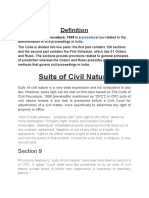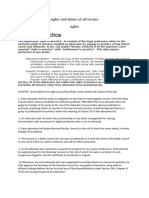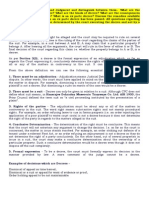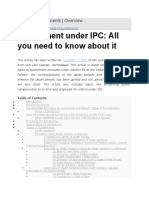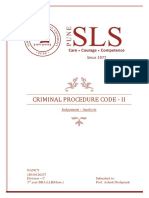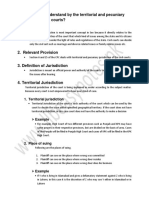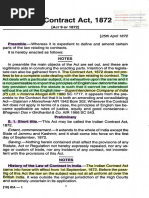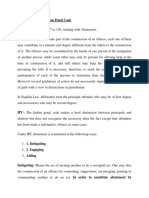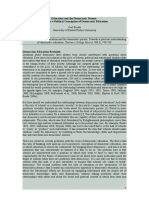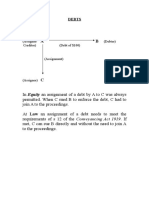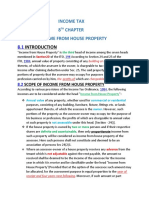Civil Nature
Civil Nature
Uploaded by
Z_JahangeerCopyright:
Available Formats
Civil Nature
Civil Nature
Uploaded by
Z_JahangeerOriginal Description:
Copyright
Available Formats
Share this document
Did you find this document useful?
Is this content inappropriate?
Copyright:
Available Formats
Civil Nature
Civil Nature
Uploaded by
Z_JahangeerCopyright:
Available Formats
The Courts shall (subject to the provisions herein contained) have jurisdiction to try all suits of a civil
nature excepting suits of which their cognizance is either expressly or impliedly barred.
Explanations
Explanation I: A suit in which the right to property or to an office is contested is a suit of a civil nature,
notwithstanding that such right may depend entirely on the decision of questions as to religious rites or
ceremonies.
Explanation II: For the purposes of this section, it is immaterial whether or not any fees are attached to
the office referred to in Explanation I or whether or not such office is attached to a particular place.
In the case of Vanamalia Ramanuja Jeer Vs. Shri Ranga Ramanuja Jeer , Honble Supreme Court
of India laid down that the following principles are to be borne in mind when deciding the
question as to whether a right to a religious office would be a right of a civil nature :i) A declaratory suit simpliciter for religious honour and privileges is not a suit of a civil nature.
ii) A suit for a declaration and to establish ones right to an office in a temple and to honours ,
privileges , remuneration or requisites attached to such an office , is a suit of civil nature .
iii) In order to mean an office the holder of the office should be under a legal obligation to
discharge the duties attached to the said office and for non-observance of which penalties can be
inflicted on him .
By the words suits expressly barred section 9 of CPC means to say that there are certain
types of suits which are barred by the code itself , such as
i) Section 11 of CPC or resjudicata barred the trial of a suit , in which the matter or issue of the
parties has already been decided by a competent court .
ii) Section 47 barred the determination of all questions relating to execution , satisfaction , and
discharge of decrees .
iii) Section 10 , Section 95 , Order 2 Rule 2 , Order 9 Rule 9 and Order 22 Rule 11 also barred to file
fresh suit .
And by the words Suits impliedly barred section 9 of CPC means to say that there are certain
types of suits which are --i) barred by general principles of law , and
ii) barred on the ground of public policy .
Some statutes also barred the jurisdiction of civil courts and conferred the jurisdiction on
Tribunals
Examples of suits of civil nature
Suits relating to right to property
Suits relating to right to worship
Suits relating to right to share in offering
Suits for damages for civil wrongs
Suits for specific relief
Suits for rent
Suits for restitution of conjugal rights
Suits for dissolution of partnership
Suits for or on accounts
Suits for damages for breach of contract etc.
Examples of suits not of civil nature
Suit of declaration of a member of a caste refrained from invitation to a caste dinner
Suit for expulsion of a member from the caste
Suits involving purely religious rites or ceremonies
Suits for upholding mere dignity or honor
Suits for recovery of voluntary payments of offerings etc.
Conditions
A Civil Court can try suits related to civil cases provided the two conditions are satisfied:
Suit should of civil nature
Cognizance of such a suit should not have been expressly or impliedly barred (Ex: Because of
the constitution of a special court / tribunal to deal with such matters)
You might also like
- Foundations of Law NCA SummaryDocument48 pagesFoundations of Law NCA SummaryJed_Friedman_874483% (6)
- Evidence Law KSLUDocument98 pagesEvidence Law KSLUswaroopbangNo ratings yet
- Example of A Comfort LetterDocument5 pagesExample of A Comfort LetterZ_JahangeerNo ratings yet
- Affidavit of DesistanceDocument25 pagesAffidavit of DesistanceAnne Secretbox90% (10)
- CRPCDocument9 pagesCRPCJigar Jayprakash Trivedi100% (1)
- Comfort LetterDocument5 pagesComfort LetterZ_JahangeerNo ratings yet
- Republic of The Philippines Department of Justice REGISTRY OF DEEDS OFDocument2 pagesRepublic of The Philippines Department of Justice REGISTRY OF DEEDS OFAybern Phone0% (1)
- Suits of Civil Nature: Section 9Document20 pagesSuits of Civil Nature: Section 9ashi sharmaNo ratings yet
- CPC NotesDocument170 pagesCPC Notesstevin.john538No ratings yet
- DEEMED DECREEDecree, Order and JudgmentDocument4 pagesDEEMED DECREEDecree, Order and JudgmentVikram BijNo ratings yet
- Rights and Duties of AdvocatesDocument11 pagesRights and Duties of AdvocatesSunayana GuptaNo ratings yet
- Meaning and Nature of Evidence LawDocument122 pagesMeaning and Nature of Evidence LawMulugeta AkaluNo ratings yet
- Res Sub Judice SDocument7 pagesRes Sub Judice SMohitDiwanNo ratings yet
- CRPC Question Answer2018-2017Document23 pagesCRPC Question Answer2018-2017tarundaburNo ratings yet
- Hostile Witness: Critical AnalysisDocument5 pagesHostile Witness: Critical Analysisadarsh kumarNo ratings yet
- Bnss AnswersDocument9 pagesBnss AnswersCPL. Swesthi VarshaNo ratings yet
- CPCDocument18 pagesCPCsheikhshaimNo ratings yet
- CPC NotesDocument3 pagesCPC NotesKalpit Sharma100% (1)
- Jurisdiction of Civil Courts Under Code of Civil ProcedureDocument12 pagesJurisdiction of Civil Courts Under Code of Civil ProcedureshwetaskasbeNo ratings yet
- Recognized Agents & PleadersDocument2 pagesRecognized Agents & PleadersAnanya Chakilam100% (1)
- Relevancy and AdmissibilityDocument7 pagesRelevancy and Admissibilityamritam yadavNo ratings yet
- Witness Under The Indian Evidence ActDocument2 pagesWitness Under The Indian Evidence Actambikaraghav1094No ratings yet
- CRPC ChartDocument2 pagesCRPC ChartKusum Kali MitraNo ratings yet
- SRADocument14 pagesSRAHarshada SinghNo ratings yet
- Essentials of DecreeDocument16 pagesEssentials of DecreeShekhar SumanNo ratings yet
- May Presume, Shall Presume and Conclusive ProofDocument5 pagesMay Presume, Shall Presume and Conclusive ProofAishwarika PodderNo ratings yet
- CPC NotesDocument49 pagesCPC NotesRKS KR100% (1)
- All About Punishment Under IPCDocument34 pagesAll About Punishment Under IPCGunjan JoshiNo ratings yet
- LAW of EVIDENCE - II - Examination of Witnesses, Leading QuestionsDocument8 pagesLAW of EVIDENCE - II - Examination of Witnesses, Leading Questionssupervu100% (1)
- Judgement CRPC 2 FinalDocument11 pagesJudgement CRPC 2 FinalNancy SinghNo ratings yet
- Appointment of Next FriendDocument7 pagesAppointment of Next FriendEsha JavedNo ratings yet
- Professional EthicsDocument36 pagesProfessional Ethicsajaymohan022No ratings yet
- Temporary Injunction Under CPC Order 39Document39 pagesTemporary Injunction Under CPC Order 39sanjana seth100% (1)
- B.P. SINGHAL V. UNION OF INDIA and ANR 2Document14 pagesB.P. SINGHAL V. UNION OF INDIA and ANR 2gfvjgvjhgvNo ratings yet
- Criminal Procedure Code NotesDocument68 pagesCriminal Procedure Code NotesMudit Gupta100% (3)
- Trial of Warrant Cases by MagistrateDocument15 pagesTrial of Warrant Cases by MagistrateSaurav KumarNo ratings yet
- ACCOMPLICEDocument5 pagesACCOMPLICEAbhi TripathiNo ratings yet
- Question of Law & FactDocument10 pagesQuestion of Law & FactTuhin AhmedNo ratings yet
- Code of Civil Procedure With CaselawDocument11 pagesCode of Civil Procedure With CaselawSmartNo ratings yet
- V Fndian Evidence Act, 1872: Evident or EvldereDocument35 pagesV Fndian Evidence Act, 1872: Evident or EvldereBharat JoshiNo ratings yet
- Crimimal Trials Under CRPCDocument26 pagesCrimimal Trials Under CRPCPintu Rao100% (1)
- CPC and Limitation ActDocument54 pagesCPC and Limitation ActMohsen KhanNo ratings yet
- Difference Between Article 226 and Article 227Document2 pagesDifference Between Article 226 and Article 227Dendup100% (2)
- CPC Notes-Amish ShahDocument10 pagesCPC Notes-Amish ShahKritika SinghNo ratings yet
- Contract NotesDocument111 pagesContract NotesRiya RoyNo ratings yet
- Prayers in A Suit Where Injunction Is Sought: Made By-Priyanshi R Talesra Tyllb Roll No. 176 Div - CDocument10 pagesPrayers in A Suit Where Injunction Is Sought: Made By-Priyanshi R Talesra Tyllb Roll No. 176 Div - CPriyanshi TalesraNo ratings yet
- Transfer of Property ActDocument54 pagesTransfer of Property Actshabbir AHMAD100% (1)
- BNSSDocument5 pagesBNSSRicky MertonNo ratings yet
- Abatement Under Indian Penal CodeDocument11 pagesAbatement Under Indian Penal CodeIMRAN ALAMNo ratings yet
- Criminal Procedure CodeDocument33 pagesCriminal Procedure CodeM A MUBEEN 172919831047No ratings yet
- K3004 - Law of Property - en - v1Document24 pagesK3004 - Law of Property - en - v1Shantanu0% (1)
- CPC MainDocument13 pagesCPC MainShelly AroraNo ratings yet
- Provisions Regarding The Acquisition of Ownership by Possession Under The Law of LimitationDocument5 pagesProvisions Regarding The Acquisition of Ownership by Possession Under The Law of LimitationsrishtiNo ratings yet
- CRPC Session Court SubmissionDocument3 pagesCRPC Session Court SubmissionAman D SharanNo ratings yet
- Property LawDocument19 pagesProperty LawStuti BaradiaNo ratings yet
- BNSS Notes (BAIL-I-Dfn & Regular Bail U-S 478) 20241106050435Document5 pagesBNSS Notes (BAIL-I-Dfn & Regular Bail U-S 478) 20241106050435Tanya SinghNo ratings yet
- Rule Against PerpetuityDocument8 pagesRule Against PerpetuityBharti Kumari100% (1)
- Maintenance Under Section 125 of CRPCDocument8 pagesMaintenance Under Section 125 of CRPCRajeev100% (1)
- Distinction Between Temporary and Perpetual InjunctionDocument1 pageDistinction Between Temporary and Perpetual Injunctionsamsun009No ratings yet
- CRPC Crash Course LLBDocument63 pagesCRPC Crash Course LLBRahul parasar100% (1)
- Unit - 2, Topic - 3, ConciliationDocument23 pagesUnit - 2, Topic - 3, ConciliationAshutosh BagchiNo ratings yet
- Gurbaksh Singh Sibbia vs. State of PunjabDocument3 pagesGurbaksh Singh Sibbia vs. State of PunjabMAMATHA NaiduNo ratings yet
- BSA - EstoppelDocument10 pagesBSA - EstoppelHitanshi PandyaNo ratings yet
- Muslim Family Law in India (Part 1: Sources of Law, Marriage, Divorce, Maintenance, Guardianship)From EverandMuslim Family Law in India (Part 1: Sources of Law, Marriage, Divorce, Maintenance, Guardianship)Rating: 4 out of 5 stars4/5 (6)
- Const.p. 9 2010Document25 pagesConst.p. 9 2010Z_Jahangeer100% (1)
- Article 184 of Constitution of 1973Document11 pagesArticle 184 of Constitution of 1973Z_Jahangeer100% (1)
- Role of Different Castes, People's Means of Earning and of DwellingDocument6 pagesRole of Different Castes, People's Means of Earning and of DwellingZ_JahangeerNo ratings yet
- 747739Document335 pages747739Z_JahangeerNo ratings yet
- Icome Regime of AgriDocument13 pagesIcome Regime of AgriZ_JahangeerNo ratings yet
- Author Pre Print TCRDocument20 pagesAuthor Pre Print TCRZ_JahangeerNo ratings yet
- Complete Thesis EditedDocument61 pagesComplete Thesis EditedZ_JahangeerNo ratings yet
- As China Woos Nepal, Some Lessons For India: Gayathri IyerDocument9 pagesAs China Woos Nepal, Some Lessons For India: Gayathri IyerZ_JahangeerNo ratings yet
- We Stress Learning, Not Teaching .. (SVA) : DirectionsDocument2 pagesWe Stress Learning, Not Teaching .. (SVA) : DirectionsZ_JahangeerNo ratings yet
- Rohimi Shapiee, Rao Qasim Idrees: ISSN Online: 2159-4635 ISSN Print: 2159-4627Document18 pagesRohimi Shapiee, Rao Qasim Idrees: ISSN Online: 2159-4635 ISSN Print: 2159-4627Z_JahangeerNo ratings yet
- DeterminersDocument26 pagesDeterminersZ_JahangeerNo ratings yet
- Diagram: (Assignor (Debtor) Creditor) (Debt of $100)Document1 pageDiagram: (Assignor (Debtor) Creditor) (Debt of $100)Z_JahangeerNo ratings yet
- Debts: (Assignor (Debtor) Creditor) (Debt of $100)Document1 pageDebts: (Assignor (Debtor) Creditor) (Debt of $100)Z_JahangeerNo ratings yet
- Eurasian Integration 1Document19 pagesEurasian Integration 1Z_JahangeerNo ratings yet
- Fetters of Gold and Paper: Barry Eichengreen and Peter TeminDocument15 pagesFetters of Gold and Paper: Barry Eichengreen and Peter TeminZ_JahangeerNo ratings yet
- Havard Et Al v. Wayne County Et Al - Document No. 2Document5 pagesHavard Et Al v. Wayne County Et Al - Document No. 2Justia.comNo ratings yet
- Ed 407 Course OutlineDocument3 pagesEd 407 Course OutlineEdwin SamisNo ratings yet
- 13 PDFDocument8 pages13 PDFEdrickNo ratings yet
- RAJHARSHDocument2 pagesRAJHARSHyigov19191No ratings yet
- Single Member Companies Rules, 2003Document5 pagesSingle Member Companies Rules, 2003AsimsaNo ratings yet
- TIMTA Annex A Instructional Guide-Feb. 17, 2021Document7 pagesTIMTA Annex A Instructional Guide-Feb. 17, 2021Jeanette LampitocNo ratings yet
- Hostile WitnessDocument2 pagesHostile WitnessGautam KashyapNo ratings yet
- PGRC ReportDocument336 pagesPGRC ReportNABARDNo ratings yet
- CS (OS) 3032/2014 Deepak Chopra v. FLAKT (India) Pvt. LTD.: Efore Ajiv Ahai NdlawDocument3 pagesCS (OS) 3032/2014 Deepak Chopra v. FLAKT (India) Pvt. LTD.: Efore Ajiv Ahai NdlawSai VijitendraNo ratings yet
- In Re: Published Alleged Threats Against Members of The Court in The Plunder Law Case Hurled by Atty. Leonard de VeraDocument2 pagesIn Re: Published Alleged Threats Against Members of The Court in The Plunder Law Case Hurled by Atty. Leonard de VeraFatima Briones100% (1)
- The Constitution of Umunne Cultural Association in MinnesotaDocument11 pagesThe Constitution of Umunne Cultural Association in MinnesotaKen FegbebohNo ratings yet
- Prospectus: Table Tennis Federation of IndiaDocument6 pagesProspectus: Table Tennis Federation of IndiaSwami AbhayanandNo ratings yet
- Areas Affected by War On TerrorDocument1 pageAreas Affected by War On TerrorEdlyn Esperanzate OrtizNo ratings yet
- Newtech V State of UP RERADocument45 pagesNewtech V State of UP RERAvasu.181900No ratings yet
- Romualdez Marcos V ComelecDocument5 pagesRomualdez Marcos V ComelecRaven AlfareroNo ratings yet
- Tata Steel: President of TWU-Ravi Prasad Vice-President of TWU - Aravind Kumar PandeyDocument2 pagesTata Steel: President of TWU-Ravi Prasad Vice-President of TWU - Aravind Kumar PandeyEkta RoyNo ratings yet
- Kurek v. United States Federal Justice, The - Document No. 5Document2 pagesKurek v. United States Federal Justice, The - Document No. 5Justia.comNo ratings yet
- The Tax Disputes and Litigation Review: Law Business ResearchDocument26 pagesThe Tax Disputes and Litigation Review: Law Business ResearchJoefrey UyNo ratings yet
- 5 7 09 Wls Elcano Washoe Legal Services Dismissal Letter Citing Judge Linda Gardner's Order Sole Cause 26405 26800 00696Document2 pages5 7 09 Wls Elcano Washoe Legal Services Dismissal Letter Citing Judge Linda Gardner's Order Sole Cause 26405 26800 00696NevadaGadflyNo ratings yet
- Guy and Cheu v. IgnacioDocument3 pagesGuy and Cheu v. IgnacioGino Alejandro SisonNo ratings yet
- INCOME TAX Chapter-8 NoteDocument8 pagesINCOME TAX Chapter-8 NoteRAGIB SHAHRIAR RAFINo ratings yet
- Letter of IntentDocument3 pagesLetter of IntentJapArcaNo ratings yet
- Declined - New BECU Account PDFDocument2 pagesDeclined - New BECU Account PDFSwaiftNo ratings yet
- Standard Forms Bid SecurityDocument20 pagesStandard Forms Bid SecuritySampath LiyanrachchiNo ratings yet
- NISCE, Alyssa Angela R. 12081000 - G06 Legal Writing Assignment #1Document5 pagesNISCE, Alyssa Angela R. 12081000 - G06 Legal Writing Assignment #1Ally NisceNo ratings yet
- De Guzman vs. PeopleDocument3 pagesDe Guzman vs. PeoplejieNo ratings yet
- PD 1267Document5 pagesPD 1267givemeasign24No ratings yet







